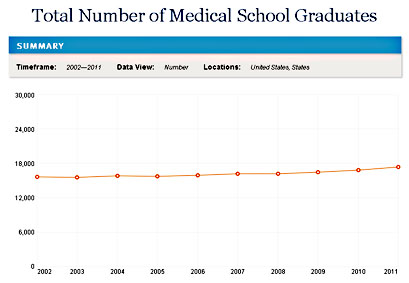After writing yesterday about the reason we pay doctors so much, I received a bunch of tweets basically calling me a communist, or a moron, or sometimes a communist moron. I mostly ignored them because that’s what I usually do, but Matt Yglesias didn’t. You can view some of the reactions he got to a similar post here.
Anyway, the whole thing is kind of amusing. There are certainly some people who would consider Yglesias and me raving redistributionist socialists, and I guess that’s fair enough. It’s the price you pay in America for advocating modestly more progressive taxes. But in this case, at least, we’re the ones taking the side of the free market. American doctors are paid far more than doctors anywhere else in the world, and yet we have fewer doctors per capita than nearly any other rich country. Why is that? One especially misguided tweeter suggested that this was, yet again, the fault of Big Gummint, which controls the number of residency slots for new medical schools grads, and therefore keeps the number of doctors low. There’s a certain kernel of truth to this, because the federal government subsidizes residency programs to the tune of $13 billion per year, just as the federal government controls Medicare  reimbursement rates via a committee called the RUC. But that’s only half the story. Who controls RUC? Physicians do. They have a stranglehold on it. And who controls how many residency slots there are and what specialties they’re in? Again, physicians do.
reimbursement rates via a committee called the RUC. But that’s only half the story. Who controls RUC? Physicians do. They have a stranglehold on it. And who controls how many residency slots there are and what specialties they’re in? Again, physicians do.
So the number and composition of residencies is controlled by doctors, even as they’re subsidized by $13 billion in taxpayer money every year. And doctor pay, which almost everywhere is based on Medicare rates, is controlled by doctors. It’s doctors who are directly responsible for both their own high pay and their own low numbers.
Another tweeter suggested that, in fact, the number of med schools and med school grads has been rising steeply over the past decade. But it ain’t so. Since 2002, we’ve opened 13 new MD-granting med schools, an increase of about 10 percent. Likewise the number of med school grads has risen from about 15,000 to about 17,000, again an increase of 10 percent. That’s roughly the same as the overall population growth of the United States. The number of medical schools per capita and the number of med school grads per capita has barely budged in that time.
Whatever else you think about our views on the economy or the proper role of government, in this case Yglesias and I are the ones on the side of the free market. Let the number of doctors rise to meet demand. Let the number of nurse practitioners rise to meet demand, and stop artificially restricting what they’re allowed to do. That will put downward pressure on prices all by itself. Then we can add some Big Gummint to the mix by taking RUC out of the hands of physicians and using it to set lower prices. But by then we’ll be pushing on an open door. The market will have already done all the heavy lifting.














